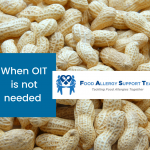What to Expect and How to Prepare for an Oral Food Challenge

If your allergist believes you or your child might not have a food allergy, the next step is to perform an oral food challenge (OFC).
OFCs are used when a careful medical history and allergy tests, such as skin and blood tests, are inconclusive. A food challenge is considered the gold standard for food allergy diagnosis and consists of eating gradually increasing amounts of the food in question under medical supervision. The risks of an OFC include experiencing mild symptoms like itching, hives, and nausea to more severe symptoms including anaphylaxis.
Most reactions to food challenges result in skin or stomach symptoms and are usually mild because the concerning food is fed gradually and is usually stopped at the first sign of reaction (except in the case of clinical trials, which often need to meet objective criteria before stopping). Your allergist will have all the necessary medications on hand to treat a reaction, including epinephrine just in case.
An OFC typically lasts a few hours so come prepared with tablets, books, and other engaging activities to help pass the time and aid in distracting younger children. Parents should be encouraged to bring their child’s favorite cups, plates, and utensils from home to create a sense of familiarity. You need to be in good health on the day of the test and underlying chronic allergic conditions such as asthma, atopic dermatitis (eczema) and allergic rhinitis (hay fever) have to be well controlled, so they do not interfere with the interpretation of any symptoms. Don’t forget to bring your epinephrine autoinjector with you for the car ride home in the unlikely event of a delayed allergic reaction after you have left the office following the food challenge. Both intranasal and oral antihistamines should be stopped a few days before the OFC since they might mask mild early symptoms. Do NOT stop any asthma or topical eczema medications. Avoid scheduling OFCs during times of year where your seasonal allergies are poorly controlled.
Talk to your doctor to determine who is responsible for providing the food for the day of the challenge. Some allergists may ask you to provide the food or the office may provide it for you. If you are responsible for bringing food, make sure it’s not processed in a shared facility or processed on a shared line with something else you’re allergic to. For infants, younger children, or picky eaters, you may need to have several food options ready to minimize the possibility of food refusal. Have food options available in both liquid and solid forms along with tasty mixers and condiments to mask bad tastes including ketchup, chocolate sauce, applesauce, candy, etc. Please do not pre-mix the food unless otherwise instructed as the allergist needs to accurately measure out how much is being ingested.
Make sure to have a light meal or snack prior to the challenge. This is especially important for young children to encourage a more robust appetite on the day of the appointment. The OFC starts with a small serving of the food followed by a wait period of around 15-30 minutes. If no symptoms are present, a slightly larger amount is provided. This pattern repeats around 4-6 times until a full age-appropriate portion of the concerning food is eaten. Expect a physical examination and vital sign measurements at the start of the challenge and at the end, as well as intermittently throughout the challenge if needed.
If your child passes the OFC, it is recommended that you continue to include this food in the diet on a regular basis moving forward. Having an allergic reaction after a passed OFC is very uncommon. Of course, if you fail the OFC continued strict avoidance is recommended.
******************
Dr. Justin Greiwe is an allergist/immunologist practicing in Cincinnati, Ohio




